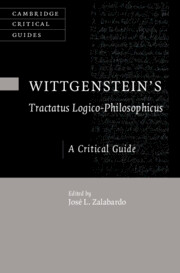Book contents
- Wittgenstein’s Tractatus Logico-Philosophicus
- Cambridge Critical Guides
- Wittgenstein’s Tractatus Logico-Philosophicus
- Copyright page
- Contents
- Contributors
- Introduction
- Chapter 1 Wittgenstein’s Impatient Reply to Russell
- Chapter 2 Modality in Wittgenstein’s Tractatus
- Chapter 3 Clarification and Analysis in the Tractatus
- Chapter 4 The Fish Tale: The Unity of Language and the World in Light of TLP 4.014
- Chapter 5 That Which ‘Is True’ Must Already Contain the Verb: Wittgenstein’s Rejection of Frege’s Separation of Judgment from Content
- Chapter 6 Solipsism and the Self
- Chapter 7 The Tractatus and the First Person
- Chapter 8 Arithmetic in the Tractatus Logico-Philosophicus
- Chapter 9 ‘Normal Connections’ and the Law of Causality
- Chapter 10 The Ethical Dimension of the Tractatus
- Chapter 11 “Obviously Wrong”: The Tractatus on Will and World
- References
- Index
- Cambridge Critical Guides
Chapter 4 - The Fish Tale: The Unity of Language and the World in Light of TLP 4.014
Published online by Cambridge University Press: 07 March 2024
- Wittgenstein’s Tractatus Logico-Philosophicus
- Cambridge Critical Guides
- Wittgenstein’s Tractatus Logico-Philosophicus
- Copyright page
- Contents
- Contributors
- Introduction
- Chapter 1 Wittgenstein’s Impatient Reply to Russell
- Chapter 2 Modality in Wittgenstein’s Tractatus
- Chapter 3 Clarification and Analysis in the Tractatus
- Chapter 4 The Fish Tale: The Unity of Language and the World in Light of TLP 4.014
- Chapter 5 That Which ‘Is True’ Must Already Contain the Verb: Wittgenstein’s Rejection of Frege’s Separation of Judgment from Content
- Chapter 6 Solipsism and the Self
- Chapter 7 The Tractatus and the First Person
- Chapter 8 Arithmetic in the Tractatus Logico-Philosophicus
- Chapter 9 ‘Normal Connections’ and the Law of Causality
- Chapter 10 The Ethical Dimension of the Tractatus
- Chapter 11 “Obviously Wrong”: The Tractatus on Will and World
- References
- Index
- Cambridge Critical Guides
Summary
This chapter explores Wittgenstein’s two references to the arts in 4.014. The first is his musical example of the unity of language and the world; the second his allusion to the fairytale The Gold-Children by Brothers Grimm. The chapter argues, first, that Wittgenstein’s early notion of logic incorporates forms that for Kant belong to transcendental aesthetic, namely, space and time. Second, it spells out how this commitment motivates Wittgenstein’s musical example and why it is crucial to draw a distinction between transcendental form and empirical structures made possible by that form. Finally, the chapter argues, pace Peter Sullivan, that the unity of language and the world is guaranteed by the metaphysical subject as their common origin. If the fairytale is read as a condensed illustration of Wittgenstein’s position, then this common origin is signified by a golden fish.
Keywords
- Type
- Chapter
- Information
- Wittgenstein's Tractatus Logico-PhilosophicusA Critical Guide, pp. 69 - 89Publisher: Cambridge University PressPrint publication year: 2024



